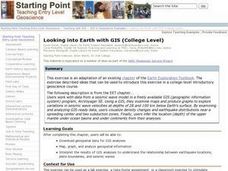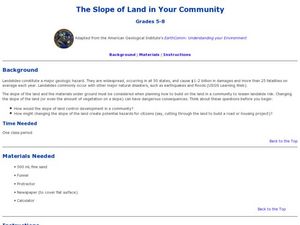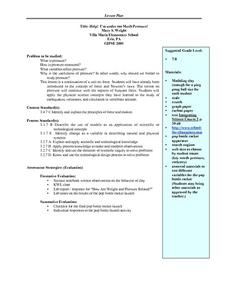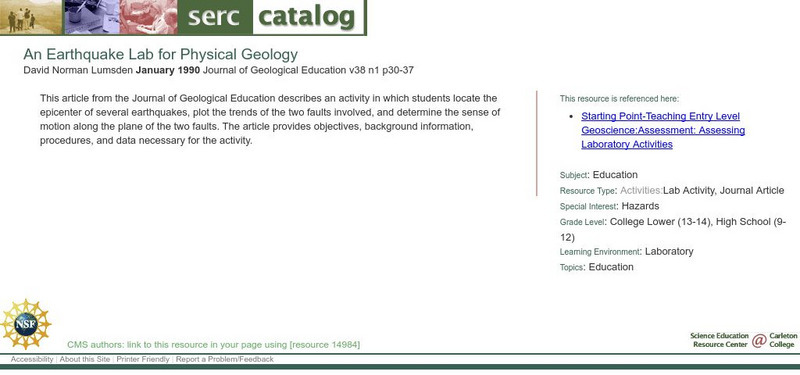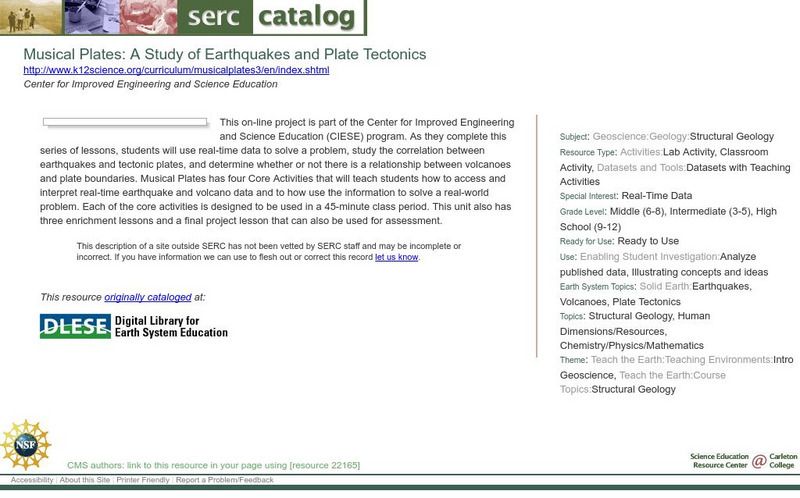Curated OER
Plate Tectonic - Volcanoes Post Lab
First graders draw an erupting volcano. They learn the components of an erupting volcano.
Curated OER
Plate Tectonic - Volcanoes Pre Lab
Second graders draw and compare parts of volcano. They investigate parts of a volcano and distinguish between magma and lava.
Science Matters
Fault Formations
The San Andreas Fault moves about two inches a year, approximately the same rate fingernails grow—crazy! The third lesson in the series allows for hands-on exploration of various fault formations. Through the use of a Popsicle stick,...
Science 4 Inquiry
Edible Plate Tectonics
Many people think they can't observe plate tectonics, but thanks to GPS, we know that Australia moves at a rate of 2.7 inches per year, North America at 1 inches per year, and the Pacific plate at more than 3 inches per year! Scholars...
Curated OER
Looking into Earth with GIS
Students work with data from a seismic wave model in a freely available GIS (geographic information system) program, ArcVoyager SE. Using a GIS, they examine maps and produce graphs to explore variations in seismic wave velocities at...
Curated OER
Pangaea Puzzle
Students explore plate tectonics and the formations of the Earth's surface and why maps are distorted. In this Earth's surface lesson plan students complete a lab and answer questions.
Science 4 Inquiry
Layers and Laws: The Law of Superposition and Index Fossils
What can layers of rock teach us about the climate? Young scientists solve a mystery about who stole a cookie by applying the law of superposition. Then, they apply the same concept to solve a more difficult mystery, trying to determine...
Curated OER
Build It With Lincoln Logs!
Students use primary sources to analyze advertisements, prices, and styles of Lincoln Logs from Carson Pirie Scott catalogs from 1952 to 1960. Students then compare modern-day toy to Lincoln Logs of the 1950s by analyzing differences in...
Curated OER
The Slope of Land in Your Community
Students participate in finding the slope of a sand pile and then other materials. In this geology lesson, students describe what happens to the piles of materials when they are poured through a funnel. Students measure the slope using a...
Curated OER
Watch Out for Landslides
Learners conduct an experiment. In this landslides lesson, students learn about landslides and discuss how they could minimize the risk of landslides. Learners complete an experiment to see if changing the slope of the land helps...
Curated OER
Paper Bridge
Students view a video about bridges. They create their own bridge out of paper and share it with the class. They create an advertisement for a bridge shown in the film.
Curated OER
Plate Tectonics
Students reinforce their knowledge of plate tectonics from what they have already learned on the subject. In this science lesson, students watch a small clip from the movie "Ice Age" which engages the students to participate throughout...
Curated OER
Forces, Loads, Materials, Shapes
Students investigate forces, loads, materials and shapes as they relate to science. In this science lesson, students differentiate between the basic definitions required to perform a scientific experiment. They answer questions dealing...
Curated OER
Help! I'm Under Too Much Pressure!
Pupils play with a ping pong ball sized piece of modeling clay observing what happens to the clay as they play with it and write their observations in their notebooks. They share the results of their observations introducing the term...
Science Education Resource Center at Carleton College
Serc: An Earthquake Lab for Physical Geology
This article from the Journal of Geological Education describes an activity in which students locate the epicenter of several earthquakes, plot the trends of the two faults involved, and determine the sense of motion along the plane of...
Science and Mathematics Initiative for Learning Enhancement (SMILE)
Smile: Earthquake Waves and Their Destructions
Looking for the epicenter of an earthquake and measuring the magnitude of waves are goals for students in this lesson plan for intermediate to middle school students. Students get to analyze the P and S waves.
Science Education Resource Center at Carleton College
Serc: Musical Plates: A Study of Earthquakes and Plate Tectonics
Four part lab activity involves students using real-time data to solve a problem, study the correlation between earthquakes and tectonic plates, and determine whether or not there is a relationship between volcanoes and plate boundaries.






